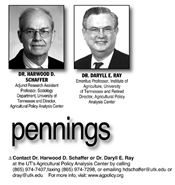|
Whose Agricultural And Food Policy Is It, Anyway?

If you asked, “Who benefits from agricultural policy?” we suspect that the first answer would be “farmers.” And, that would be partly correct. Farmers are directly affected by agricultural policy. Agricultural policy establishes the rules within which they engage in the production of food and fiber. But if they were not farmers, they could do something else to earn their living.
Consumers, on the other hand, we would argue, are the primary beneficiaries of agricultural policy. Consumers have no option but to eat. And, without the right set of policies in place there might not be anything on the shelves of the local supermarket. That may seem like a stretch, but in the former Soviet Union there were periods of time when there was no bread on the shelves of bakeries.
Looking back into the oldest written records, it becomes clear that in addition to maintaining military dominance within their boundaries, ancient civilizations were concerned with maintaining adequate food supplies for their populations. Many of the oldest texts are records of agricultural production and distribution. Without a stable supply of food, ancient rulers knew that their hold on power was in jeopardy. At a minimum they needed to have access to a sufficient supply of food to feed their armies that in turn could dominate restive populations. Without the severe kind of oppression we see in North Korea, failing to make an adequate supply available to the general populace is not an option
Governments need to establish policies to ensure the production of food domestically, import it from elsewhere, or a combination of the two. Unless the territory in question is insufficient to provide the needed food, domestic production and policies that set the framework for that production are essential. To the extent that they can, the choice of governments is generally self-production, particularly basic foodstuffs. And that is where farmers come in.
The needs of consumers are primary and agricultural policy serves to set the framework within which farmers are able to work to meet the needs and desires of consumers. So, in the development of agricultural policy let’s look at the needs of both consumers and farmers.
On the consumer side, food needs to be available at prices that families can afford. On the production side, farmers need to be able to sell their production at a price that covers the full cost of production including returns to the means of production, labor, and management. When the full cost of production is higher than some consumers can afford, the government is obligated to provide the means by which that portion of the population has access to an adequate supply of nutritious and culturally appropriate foodstuffs.
All other players in the market from seed dealers to, to commodity merchandizers, to food processing firms serve to meet the needs of these two: consumers and farmers.
And when we look at it, that is the way the farm bill is constructed. The largest portion goes to the consumers who lack adequate financial resources to fully participate in the marketplace for food. And, farmers need policies in place so they receive a market price that covers the full cost of production, if they are to be in a position to provide a reliable and adequate supply of foodstuffs.
The farm bill should not be designed to ensure that agribusinesses can maximize their sales and revenue, though that has clearly been the goal of all recent farm bills beginning with the 1985 Farm Bill. Unlike farmers, those entities have the means to manage their production in ways that maintain their profitability. ∆
DR. HARWOOD D. SCHAFFER: Adjunct Research Assistant Professor, Sociology Department, University of Tennessee and Director, Agricultural Policy Analysis Center
DR. DARYLL E. RAY: Emeritus Professor, Institute of Agriculture, University of Tennessee and Retired Director, Agricultural Policy Analysis Center
|
|